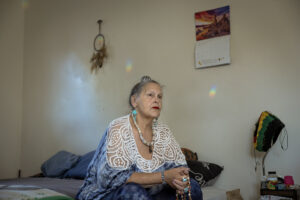Medical cannabis paved the way for legalization in California. Now patients feel left behind

Turn off Highway 99 in rural Elverta, drive five miles down the road and you’ll find a dusty lot crammed with cars on this scorching Friday evening. Behind the wooden fence, for a $10 entry fee, awaits a gathering akin to a block party crossed with a high-potency farmers market.
Alongside shirtless young men displaying jars of weed and decorative bongs, there are tacos and smoothies for sale. A woman in cannabis leaf-patterned shorts peruses the merchandise, while another with a severe black bob offers dab hits near the front. The DJ occasionally interrupts his mix of throwback hip-hop tunes (do you enjoy Coolio’s “Fantastic Voyage”?) to sell tickets for a raffle raising money for one vendor’s comatose employee.
Next to his booth, a table gives out free cannabis for veterans, who don’t have to pay to get into the event. Neither do patients with a doctor’s recommendation, like Dannie, a barber who was shot three times in his left arm and smokes cannabis to manage pain often inflamed by cutting hair.
Dannie, who agreed to be identified only by his first name, said he carries a medical recommendation because it’s safer should he ever get stopped by the police. But he still prefers buying weed at these clandestine pop-ups, where the products are more potent than at a dispensary.
“I’d rather spend my $30 on something that lasts,” he said.
This is just one of four unlicensed cannabis “seshes” in the Sacramento area that Bette Braden will host this week, as she does every week. The events started eight years ago for medical marijuana patients in an era of looser regulations, before California legalized recreational sales.
Since 2016, when voters approved Proposition 64, the initiative that authorized a commercial cannabis market in the state, Braden has come to view her seshes as both a business opportunity and an act of protest. Like many longtime advocates, she believes all weed use has a medical purpose, and considers it immoral that high taxes and a lack of dispensaries have made it inaccessible to many patients.
“The laws are so hideous,” Braden said, as she supervised from a camp chair near the entrance. “I used to be an activist. Now I’ve gone over to the underground.” Read more >>>